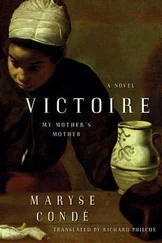Another nurse was adamant that Celanire had the power to shed her body like a snake shedding its skin in the undergrowth. One night when the wind and the rain were making the shutters bang, the young girl had entered Celanire’s room unexpectedly and had seen a little heap of soft, shapeless flesh and skin in front of the wide-open window. Hiding behind a closet, she had watched as the young woman returned in the early hours of the morning. Her mouth smeared with blood, she had slipped back into her mortal coil and calmly returned to bed. No doubt about it, Celanire was under the spell of powerful aawabo .
Can one really believe such nonsense and malicious gossip?
One thing for certain was not a pack of lies; the Home entered six candidates, including four girls, for the native certificate of elementary studies in June. All passed, even the girls, and were immediately hired by the mission schools and the administration. As a recompense for her extraordinary results Thomas de Brabant was to award Celanire the medal for academic excellency, a large bronze medal attached to a purple ribbon. From two o’clock in the afternoon all that Bingerville could muster in the way of civil servants, merchants, missionaries, members of the royal family, cooks, nannies, tarbooshed guards, and militia had gathered on the lawns of the Home out of curiosity and were drinking barley water. People arrived on foot and in fishing canoes from Grand-Bassam and Assinie. In everyone’s view, the transformation of the Home in such a short time was pure witchcraft. How could the palms, the orchard, and the bamboo groves have grown so fast? How could the fruit trees be loaded with so much fruit in such a short time? Lemons as big as grapefruit! Mangoes that looked as though they had been grafted! Avocados as heavy as pears! All eyes were turned on Celanire and Tanella. At a quick glance they could have passed for twins. They were the same height, same weight, same velvety black-black skin. They were dressed identically except for the bouffant scarf of raw silk tied around Celanire’s neck. They wore the same Soir de Paris perfume, and their makeup and hairstyles were identical. Despite this resemblance, it was obvious that, between the two, Celanire was the leader and the brains while Tanella, in spite of her unusual, murderous act, simply followed her instructions. It was also obvious that Celanire was the less infatuated of the two. Tanella looked up to Celanire as if she were the holy of holies or the Eucharist, and Celanire was overjoyed to be the object of such boundless admiration.
The ceremony opened with the Home’s choir singing Vivaldi’s Gloria a cappella. Then the governor gave his speech and pinned the medal on the oblate’s breast, followed by the official embrace in the name of France. The pupils bellowed out “La Marseillaise.” There was a ripple of applause, and the celebrations began. The nurses, dressed in yellow-patterned blue wrappers, handed around petits fours, salted almonds, and Job cigarettes.
It was only once the sun began to bleed over the lagoon that the guests, stuffed to bursting, made up their minds to set off home. The inhabitants of Bingerville had scarcely finished grinding, chewing, and masticating the pittance of the memory of that lovely afternoon when two Ebriés, out fishing one night, hauled up the body of Madame Desrussie. They first thought a cayman, a sacred animal, had got tangled in their nets and were already thanking Heibonsha, the water god, for their miraculous catch, promising prosperity for many years to come, when they recognized the unfortunate widow. Her face had been beaten to a pulp. In fact they could only identify her officially from her dentition, a masterpiece fashioned by the colony’s only dentist, a soldier stationed at Assinie. This event caused quite a stir.
The widow was born Azilin Dossou. The Dossous, however, a well-known family in Adjame-Santey, had converted to Catholicism very early on, given two catechists to the mission, and changed the pagan name of their daughter to Rose. Rose, the jewel of the mission, had been one of the first to learn how to sew, read, and write. She had also been one of the first to enter the bed of a Frenchman. He had never taken the trouble to “regularize” her situation, even though everyone called her Madame Desrussie. Yet there was scarcely time to wonder whether it had been a suicide or an accidental drowning before another event followed almost immediately afterward that fired people’s imagination. They learned that Thomas de Brabant was to slip a wedding ring on Celanire Pinceau’s finger. Notified by his services, the governor-general of French West Africa cabled the Ministry for the Colonies in Paris. At that time, marital union between colonial civil servants and “native” women was frankly never heard of. What complicated matters was that Celanire was not a “native.” She was a French citizen from Guadeloupe who spoke French French and rendered remarkable services to her metropole in its civilizing mission. Moreover, she took good care of the unfortunate widowed governor’s child. After much debating, the ministry cabled its approval to the governor-general. In Bingerville itself, public opinion was divided: some of the French demanded the “nigger-loving” governor be replaced. Because of the controversy, Thomas’s wedding took place in the strictest privacy. Two witnesses: Tanella and Cyrille Sérignac de Pompigny, his right-hand man, an energetic recruiting agent for the new wharfs in Grand-Bassam. A carefully handpicked congregation: four or five district commissioners from the vicinity, all respectably married with their wives. These ladies of noble birth, more often or not with a title, eyed Celanire scornfully, this negress who was marrying their husbands’ hierarchical superior and consequently was going to have precedence over them. It was not only her color that infuriated them, but her impudent freshness. Whereas they wilted and yellowed from the heat, the humidity, the fevers and biliousness, she positively glowed. On her wedding day Celanire ignored the tradition of a white bridal gown and dressed all in pink, a pink as pale as cherry blossom during springtime in Osaka. She replaced the traditional bridal veil with a hat veil. Around her neck she wore a wide moiré silk ribbon fastened by a cameo. She looked at Thomas and Tanella in turn as if to say they must love each other as she loved them. In the great drawing room of the governor’s palace the servants uncorked bottles of champagne that kindled few bubbles, and Cyrille Sérignac de Pompigny proposed a toast to the happiness of the newlyweds.
The real festivities, however, took place at the Home. After a festive dinner — including Celanire’s homemade coconut sorbet — the pupils went up to their dormitories. The nurses then slipped out of their uniforms and got themselves up as they saw fit. Well, almost. No European-style dresses, since Celanire had very set ideas on the matter. In her opinion, an African woman who dresses in the European fashion is like a dish without condiments. Then a gang of Ebriés on their corvée hung resin flares from the trees, and the night turned as bright as daylight. Muslim houseboys busied themselves roasting meat and grilling kebabs and legs of lamb. Cooks prepared fresh and saltwater fish, pepper and groundnut stew, and pounded mountains of yams and plantains. For once Christians and pagans alike had a whale of a time until four in the morning.
Ludivine did not attend her papa’s second wedding. Just before lights-out, Thomas and Celanire walked into the dormitory, holding hands. Celanire had pushed back her veil, and her eyes gleamed like carbuncles. They sat down beside her bed and informed her of her good fortune. She was going to leave the Home and come and live with them. She was no longer an orphan in this world: she had a new maman .
Читать дальше












